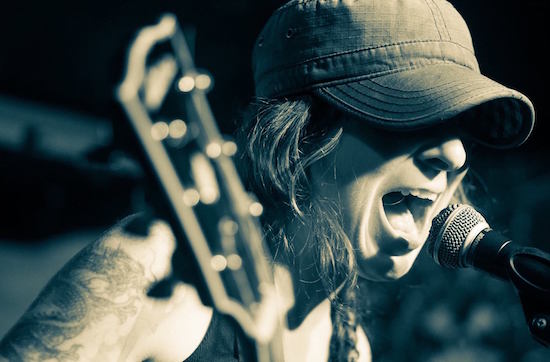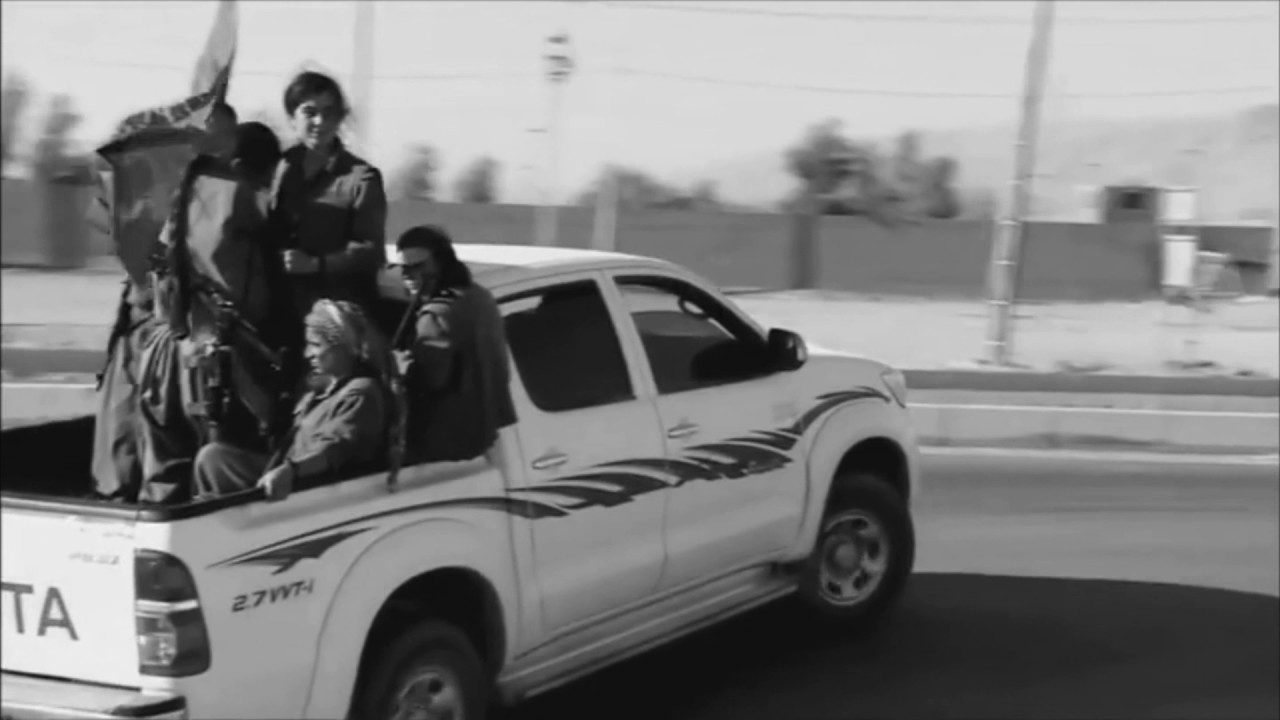When her punk group of ten years disbanded, singer and guitarist Gill Dread just kept on writing. "It’s more and more difficult to function as a musician and artist in London," says Dread of Conmungos’ split. "It’s very easy to be in a group of people who work well together but life gets in the way. Suddenly someone has to sell all their stuff because they need to make the rent or whatever. I decided to keep working and do things backwards, in a way."
As someone who also does stints as the van driver for touring bands, Dread had the viable connections to lay her subsequent self-described "rantings" onto tape. It took only a quick text to enlist Palehorse drummer Ben Dawson. Her other mates, Will Elvin of Lupins and one Seamus O’Hooligan contributed bass parts. Working around everybody’s availability meant Bruxa Maria’s debut album took a little while to complete but now it’s here in all its thunderously ugly glory.
Human Condition is influenced by Alice Donut, Melvins, Helmet, NoMeansNo and "all that good stuff," as Dread puts it. Having grown up with an older sister and brother, Dread was guided by their listening habits and became a Butthole Surfers fan at age 13. Now, she says, the noise-rock sound "just naturally comes out, it doesn’t need to be forced. It’s funny to meet people now, like Joe from Hey Colossus, and realise we were at the same gigs in the same place. Looking back, it was short and fleeting but it felt like a long time. Obviously it made a massive impact on me as well as a lot of people I know, that time from about ’89 until ’94. Then after that, I just went raving."
Extra-curricular diversions into drum & bass notwithstanding, Gill Dread has returned, via Conmungos, to her noise-rock rearing but Human Condition is no exercise in futile nostalgia. Its sublimely furious, filthily pummelling style is directly informed by the dismal world that Dread sees around her, as well as the more heartening experience of playing and touring with likeminded artists, as she explained over the phone during an appropriately drizzly November lunchtime.
I was wondering whether "Bruxa Maria" was your alter-ego.
Gill Dread: The imagery has involved me but more as a necessity. I hadn’t the privilege of getting a model or whatever. I got back into painting and was doing a lot of work to do with the 2011 riots and Mark Duggan and all that stuff. I did lots of portraits of people in bandanas. It started with just taking a picture of myself and drawing myself in a bandana because it could be anyone and doing lino prints and giving it that Spanish/Mexican vibe, which I love, but bringing it up to date with the three stripes of the Adidas. Watching the Arab Spring uprisings and the riots we had here, there was a hell of a lot of Adidas on show.
For the album cover, I put the clothes together and stood on my kitchen counter while my boyfriend took a picture on his Samsung phone. Originally I was going to go for more of a Crass look because I love their artwork but it started to look a bit shinier so we went for more of a goth style in the end. I am happy with it. It’s just when I rock up to a gig and there’s a poster with that picture, I’m glad I’ve got a bandana on. Jesus. I should choose a random abstract art thing next time. I don’t regret it but it’s, like, get over myself or whatever the fuck.
Was the video for ‘Bredder My Bredders’ your concept too?
GD: I was really excited to do videos as well. It’s another outlet for being a bit of an art wanker. That track was written off the back of when I first drove Palehorse around Europe. When you’re driving really good bands, you get inspired and write little bits down here and there and it evolved. As times unfolded, I realised it did fit that subject matter of what’s happening with refugees and I do find it heartbreaking so I thought I’m going to do it, I’m going to edit this stuff together. It is a challenge because you don’t want it to be seen as tasteless or cheesy and then have it rejected. Hopefully I’ve done it tastefully and it does come across as powerful and as reaching out and having compassion in these very hard, horrible fucking times.
Do you think there’ll be an upsurge in angry, weird, good music in light of all the trouble that’s happening in the world?
GD: Hopefully, yeah. When stuff started going horribly wrong, one of the better interviews I saw, I think with Channel 4, was Henry Rollins being asked, "Do you think there’s going to be a resurgence of punk?" Quite rightfully, he said he thought there would be a resurgence but it won’t be punk as we understand it because it will be how younger generations express themselves, what is relevant to them. I think that’s right. I identify as being a punk. To me, as an artist as well, that’s about being true to yourself even in the face of adversity. It’s not about studs and mohicans. It’s about having passion and pushing things. It’s not an outfit that you buy down in Camden and then you’ve got the label and that’s it.
To me, Human Condition is a punk album. People picked it up and started calling it ‘noise punk’ instead of ‘noise rock’. Back when I was 13 or 14, I never heard the term ‘noise rock’. It feels like a term that’s come later but maybe I’m wrong and just didn’t hear it. I think it’s a good label. There were a lot of things around in the late 80s and 90s that didn’t really have a category and were difficult to describe. As much as people say they don’t want to label things, in communication you kind of need to. The term ‘noise rock’ is helpful because there were a lot of things that weren’t grunge and weren’t metal. Those grey areas that weren’t punk-by-numbers, for want of a better phrase. I’m not opposed to it at all. ‘Noise punk’? All right, then. I’ll take that. It’s all good.
Who are ‘The Hipsters And The Heathens’ that you sing of?
GD: I suppose they’re people pretending to be artists when they’re really parasites. They’re not passionate. They’re just leaping onto the next thing like they’ve always been there. To me, hipsters are the new yuppies. They just put on different clothes. It’s to do with the individualist thing that’s risen since the 80s, which is abhorrent to me. That smash-and-grab mentality, say that cereal store or whatever, where people aren’t thinking, ‘How do I set up a business that’s going to have some longevity and put something into my community?’ Not just their little section of the community. The whole community. The more you put into your community, the more you will get out. The more you segregate yourself and become elitist, the less longevity you’ve got for the business. You make a quick buck and leave before it goes down. It’s really upsetting to me that most people choose not to invest in their community. People have got to reach out and they’ve got to care. People are saying, ‘I’ve got the freedom not to care’ and that’s heartbreaking. It’s destroying communities and creating massive divides. Start giving a shit, seriously. That’s probably why the first half of that song is quite a straight punk track. A proper rant-athon. There’s a lot of ranting on this album.
What else are you ranting about?
GD: At the time, I was reading Chavs: The Demonization Of The Working Class, which really brought me out of a rut. I was not in a good place when I read that. He puts it so well and clearly that it unmuddles your mind. It makes you so thankful that someone said that and put it in print. When you have to get to your crappy fricking job on the tube or the train in London and you’re faced with The Metro and The Evening Standard and it’s hate, hate, hate, hate, hate, you’re being told that everything around you is the complete polar opposite of what you’re experiencing.
During the 2011 riots, I was living in the Lewisham/New Cross area. There are a lot of squats, housing co-ops and whatever. There are a lot of artists trying to make their way because you can just about get low rent there, though not so much now. The riots were not a surprise to us. We were surprised it didn’t snap earlier. People in other areas, even friends close to me, they weren’t getting it. All they were told was what the media was telling them. I even had punk mates saying that all these people should’ve suddenly rallied round and smashed up Starbucks. As Ken Livingstone put it, quite well I thought, it was a spasm of anger, a natural occurrence. But the demonising backlash was absolutely, soul-destroyingly heartbreaking. Whole families chucked out of council houses because their children stood up. Of course there was abhorrent shit that happened. People get angry and they do fucked-up shit. Not to bring it round too cheesily, but it’s that human condition thing. If you back people into a corner, it’s not pretty what comes back. So don’t push people who have got nothing to lose. If they’ve got nothing to lose, you’ve got one fuck of an enemy there. And you’ve created it.
So a lot of that. I also had a lot of rantings with fellow lefty mates who were being really anti-religion, to the point of illogically shutting down freedom of speech and thought. As is often the case, the people who talk the loudest are not the true representatives. The people hate-preaching and going to extremes aren’t the run-of-the-mill religious people who have a faith to carry them through. People need to be able to relax with the fact that they haven’t got control over everything. If people do that by having a faith, fucking good to ’em, mate. People with faith have done amazing things off the strength of their faith. Those who slam people down who have a faith for being ridiculous and believing in fairy stories are massively missing the point. As long as they’re not harming you, leave them the fuck alone, man. They’re the main rants I can think of.
As well as making your own music, you drive bands around and do tour managing work. What’s that like?
GD: I wouldn’t go as far as tour managing. I’d ask for more money if I was doing that, bruv. Haha. You do end up in that role sometimes. I drive bands on tour and I do love it. Because we’re all working ridiculous hours just to break even, one way to spend quality time with people is through working. I’m very lucky that I’ve driven amazing bands. Putting myself out there renewed my faith in humankind. I’ve lost my faith in humankind multiple times, which is also within the rantings of the album. It can really help when you’ve done a long bastard drive and you feel like collapsing on floor and crying but you stand at the back of the room and watch that band play and you just feel like a proud mum. It was all fucking worth it. It’s hard work but I’ve met some of the nicest, most decent, talented people. It helps my head to be around good people, so it’s paid me tenfold in that respect. Bruxa Maria’s debut album is out now on Extreme Ultimate. They play tQ’s winter party at Corsica Studios on 6 December



